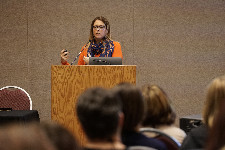
At an AACRAO Annual Meeting session on Monday, Helena Minerva of the Fashion Institute of Technology discussed the epidemic of busyness in today’s workplace and offered suggestions for shifting this culture.
Minerva presented the emotional side effects of busyness such as the encouragement of negativity, self-created stress, and the cognitive strain of evading emotions—which results in emotional atrophy or the inability to empathize. Stress also lowers our ability to remember and concentrate and can lead to emotional hoarding or work hoarding, Minerva said.
Physical side effects include an imbalance of the stress hormone cortisol, which can lead to illness. Employees who go to work stressed tend to work harder (not smarter), are more distracted and lose creativity. Managers who go to work stressed create a manufactured sense of urgency and become less effective at training, active listening and giving feedback—all of which create “second-hand stress.”
Some examples of actions that perpetuate our busy culture are emailing coworkers from home when unnecessary; holding too many unplanned meetings; and a lack of dedicated time for creative projects.
“I urge people to think about what really is urgent and what can be pushed off to later and be discussed in a less urgent, more productive environment,” Minerva said.
She noted that physically our brains can only successfully accomplish one cognitive and one physical/rote task at a time; therefore, multitasking doesn’t work. She suggests:
- In life, measure yourself by being, not by doing
- Ban “busy” from your vocabulary
- Weight your yes’s and your no’s and their expenses
- Stop competing
- Define your busyness
Other suggestions included keeping a time log and be honest about what is actually meaningful for you; make solid decisions for how to spend your time (being busy relieves us of having to make choices); and change your language (identify what is not a priority).
“This involves changing your wiring but also changing the wiring of the people you interact with on a daily basis,” she said. “Maybe small changes are possible day to day. You are not the only one who feels this way. We’re all in the same boat.”
Read more from the session here.